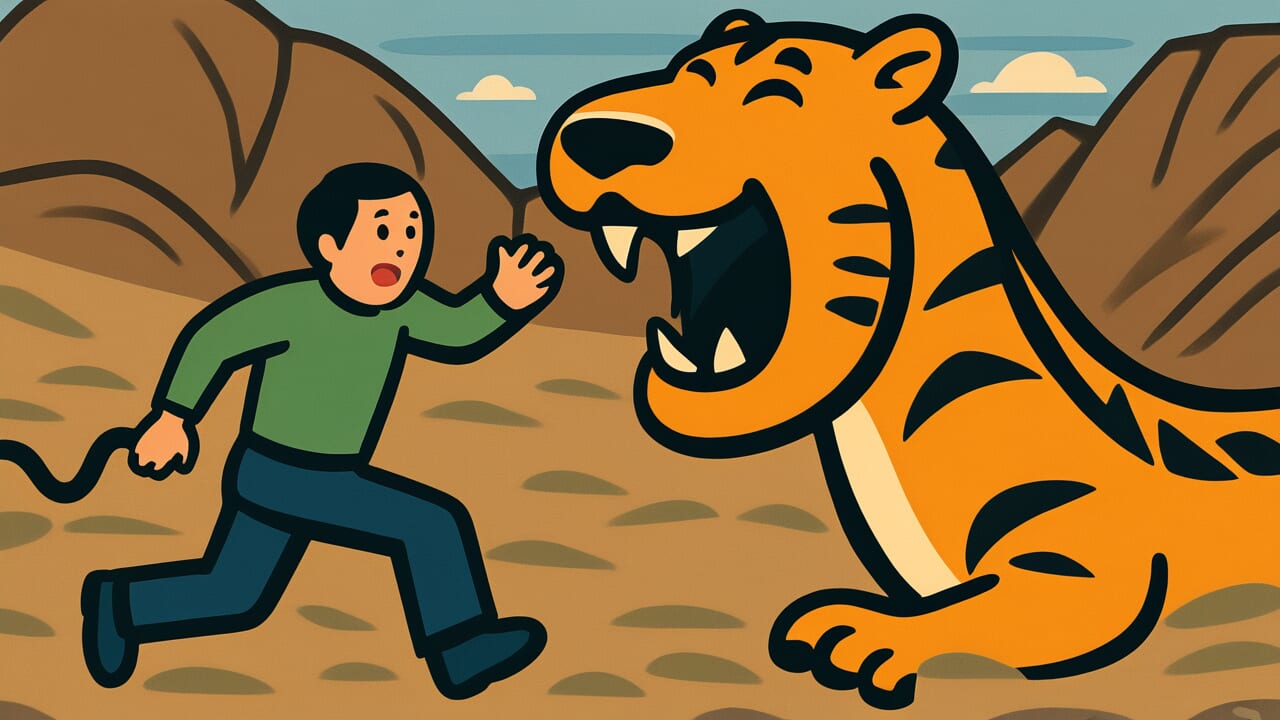How to Read “Escape the tiger’s mouth only to enter the dragon’s lair”
Kokō wo nogarete ryūketsu ni hairu
Meaning of “Escape the tiger’s mouth only to enter the dragon’s lair”
This proverb describes escaping one danger only to fall into an even greater one.
You finally escape a difficult situation and feel relieved. But that relief is short-lived.
You soon find yourself caught in an even more serious problem than before.
People use this proverb when crises happen one after another. For example, someone takes out a new loan to pay off an old debt.
This makes repayment even harder. Or someone tries to avoid trouble but their actions create bigger trouble instead.
The key point is that the second danger is worse than the first. It’s not just about facing problems one after another.
Even today, people often focus so hard on solving immediate problems that they overlook bigger ones.
This proverb captures that human behavior pattern perfectly. It reminds us to make careful judgments and remains relevant in modern life.
Origin and Etymology
This proverb likely comes from ancient Chinese classics. “Tiger’s mouth” means the danger of being attacked by a tiger.
“Dragon’s lair” refers to a cave where a dragon lives. Both represent territories of fearsome beasts from ancient times.
The way these two dangers are portrayed is fascinating. Tigers ruled the land as kings of beasts.
People feared their fangs and claws that could kill prey instantly. Dragons, on the other hand, lurked deep in water or caves.
They were seen as more mysterious beings with even greater power. So this proverb means more than just “danger to danger.”
It expresses a shift to a bigger, more serious crisis.
Ancient China had many expressions comparing life’s difficulties to animals. Tigers and dragons appeared frequently as symbols of danger because of their immense power.
We don’t know exactly when this expression reached Japan. Educated people who knew classical Chinese likely used it first.
It gradually spread to the general public. This proverb has survived because it captures a universal human experience.
The chain of crises we all face in life.
Usage Examples
- I finally escaped from that shady company, but now a fraud group is targeting me. This is truly “Escape the tiger’s mouth only to enter the dragon’s lair.”
- I invested money to pay off my debt and lost big. It turned out to be “Escape the tiger’s mouth only to enter the dragon’s lair.”
Universal Wisdom
This proverb has survived because it brilliantly captures how hard it is to make good decisions during a crisis.
When cornered, we desperately try to escape the immediate danger. In that moment, our vision narrows dramatically.
“Getting out of here right now” becomes the only priority.
This behavior pattern is deeply rooted in human survival instinct. When we sense danger, our brain switches to “fight or flight” mode.
Our ability to think calmly decreases. Ironically, this survival instinct sometimes leads us into even greater danger.
What’s more interesting is how the proverb shows danger escalating. From tiger to dragon—danger increases.
This structure reveals the true nature of life’s chain of problems. When you solve a small problem with an easy fix, that solution itself can become the seed of a new, bigger problem.
This vicious cycle repeats not just in individual lives but also at organizational and societal levels.
Our ancestors understood this human trait deeply. That’s why they put this wisdom into the proverb.
It teaches us to look beyond immediate danger and see what lies ahead.
When AI Hears This
Why does someone fleeing a tiger end up entering a dragon’s lair? Game theory analysis shows this is a rational judgment error caused by “information asymmetry.”
The tiger is right in front of you. Its danger level is 100 percent certain.
Meanwhile, you can’t see inside the dragon’s lair. Maybe there’s no dragon there.
In this situation, the human brain calculates probabilities. If the tiger threat is 100 percent, then even if the dragon’s lair is 50 or 30 percent dangerous, it seems like the better choice.
But in reality, the probability of a dragon being in its lair might also be close to 100 percent. You just can’t see it, so your brain underestimates the risk.
Behavioral economics experiments prove that humans will take bigger loss risks to avoid “certain loss.”
For example, people choose a 50 percent chance of losing 30,000 yen over certainly losing 10,000 yen. The expected value makes the second option worse, yet people still choose it.
What’s even more interesting is that this judgment isn’t completely irrational. Facing a certain threat like a tiger, you have no choice but to bet on an uncertain option.
Humans are programmed to place hope in “invisible danger” in the worst situations. This proverb has been pointing out that cognitive system limitation for 2,000 years.
Lessons for Today
This proverb teaches modern people to step back and see the whole picture when facing difficulties.
Panic is your greatest enemy. If you focus only on escaping the immediate problem, you might make things worse.
The important thing is to ask yourself, “Is this solution really a solution?” Emergency measures and fundamental solutions are different.
Paying debt with debt, covering lies with more lies—such symptomatic treatments might bring temporary relief. But usually they just postpone problems and make them bigger.
Modern society overflows with choices. That’s exactly why we need the courage to stop and think.
Talk to someone you trust. Seek expert advice. Take a little time to compare multiple options.
That calmness will truly save you from crisis.
When you’re in a difficult situation, finding a perfect solution might be hard. But you can at least avoid “worse choices.”
This proverb gently yet firmly teaches us the importance of caution and foresight.



Comments